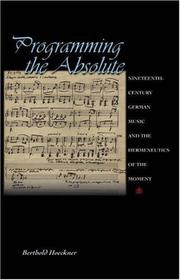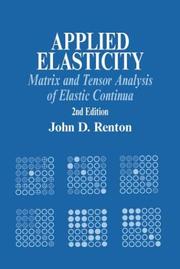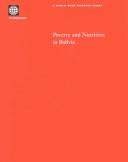| Listing 1 - 9 of 9 |
Sort by
|

Abstract | Keywords | Export | Availability | Bookmark
 Loading...
Loading...Choose an application
- Reference Manager
- EndNote
- RefWorks (Direct export to RefWorks)
Least absolute deviations (Statistics) --- Mathematical statistics --- 519.23 --- 519.23 Statistical analysis. Inference methods --- Statistical analysis. Inference methods --- Absolute deviations, Least (Statistics) --- Absolute values, Least (Statistics) --- Deviations, Least absolute (Statistics) --- LAD (Statistics) --- Least absolute values (Statistics) --- Values, Least absolute (Statistics) --- Least squares

ISBN: 0691001499 Year: 2002 Publisher: Princeton ; Oxford Princeton University Press
Abstract | Keywords | Export | Availability | Bookmark
 Loading...
Loading...Choose an application
- Reference Manager
- EndNote
- RefWorks (Direct export to RefWorks)
Absolute music --- Absolute muziek --- Musique absolue --- Music --- Art music --- Art music, Western --- Classical music --- Musical compositions --- Musical works --- Serious music --- Western art music --- Western music (Western countries) --- Abstract music --- Philosophy and aesthetics --- Germany --- 19th century

ISBN: 0857099582 1898563853 9780857099587 9781898563853 Year: 2002 Publisher: Chichester Cambridge Horwood Woodhead Publishing
Abstract | Keywords | Export | Availability | Bookmark
 Loading...
Loading...Choose an application
- Reference Manager
- EndNote
- RefWorks (Direct export to RefWorks)
This updated version covers the considerable work on research and development to determine elastic properties of materials undertaken since the first edition of 1987. It emphasises 3-dimensional elasticity, concisely covering this important subject studied in most universities by filling the gap between a mathematical and the engineering approach. Based on the author's extensive research experience, it reflects the need for more sophisticated methods of elastic analysis than is usually taught at undergraduate level. The subject is presented at the level of sophistication for engineers with mat
Elasticity. --- Deformations (Mechanics) --- Matrices. --- Calculus of tensors. --- Absolute differential calculus --- Analysis, Tensor --- Calculus, Absolute differential --- Calculus, Tensor --- Tensor analysis --- Tensor calculus --- Geometry, Differential --- Geometry, Infinitesimal --- Vector analysis --- Spinor analysis --- Algebra, Matrix --- Cracovians (Mathematics) --- Matrix algebra --- Matrixes (Algebra) --- Algebra, Abstract --- Algebra, Universal --- Elastic solids --- Mechanics --- Rheology --- Strains and stresses --- Structural failures --- Elastic properties --- Young's modulus --- Mathematical physics --- Matter --- Statics --- Strength of materials --- Properties

ISBN: 184113399X 1841130052 9781841130057 Year: 2002 Publisher: Oxford Hart
Abstract | Keywords | Export | Availability | Bookmark
 Loading...
Loading...Choose an application
- Reference Manager
- EndNote
- RefWorks (Direct export to RefWorks)
General ethics --- Legal theory and methods. Philosophy of law --- Tort and negligence --- Strict liability. --- Torts. --- Absolute liability --- Liability without fault --- Liability (Law). --- Liability (Law) --- Strict liability --- Torts --- Accountability --- Legal responsibility --- Responsibility, Legal --- Responsibility (Law) --- Civil wrongs --- Delicts --- Injuries (Law) --- Quasi delicts --- Wrongful acts --- Civil law --- Contracts --- Obligations (Law) --- Accident law --- Actions and defenses --- Negligence --- Reasonable care (Law)
Book
Year: 2002 Publisher: Washington, D.C., The World Bank,
Abstract | Keywords | Export | Availability | Bookmark
 Loading...
Loading...Choose an application
- Reference Manager
- EndNote
- RefWorks (Direct export to RefWorks)
Bourguignon, Ferreira, and Leite develop a microeconometric method to account for differences across distributions of household income. Going beyond the determination of earnings in labor markets, they also estimate statistical models for occupational choice and for conditional distributions of education, fertility, and nonlabor incomes. The authors import combinations of estimated parameters from these models to simulate counterfactual income distributions. This allows them to decompose differences between functionals of two income distributions (such as inequality or poverty measures) into shares because of differences in the structure of labor market returns (price effects), differences in the occupational structure, and differences in the underlying distribution of assets (endowment effects). The authors apply the method to the differences between the Brazilian income distribution and those of Mexico and the United States, and find that most of Brazil's excess income inequality is due to underlying inequalities in the distribution of two key endowments: access to education and to sources of nonlabor income, mainly pensions. This paper is a product of the Research Advisory Staff. The authors may be contacted at fbourguignon@worldbank.org, fferreira@econ.puc-rio.br or phil@econ.puc-rio.br.
Absolute Poverty --- Counterfactual --- Economic Theory and Research --- Finance and Financial Sector Development --- Financial Literacy --- Health, Nutrition and Population --- Household Consumption --- Household Income --- Household Per Capita Income --- Household Survey --- Household Surveys --- Income --- Income Distribution --- Income Inequality --- Inequality --- Labor Policies --- Macroeconomics and Economic Growth --- Population Policies --- Poverty --- Poverty Impact Evaluation --- Poverty Incidence --- Poverty Levels --- Poverty Line --- Poverty Measures --- Poverty Rates --- Poverty Reduction --- Rural --- Rural Areas --- Rural Development --- Rural Income --- Rural Poverty Reduction --- Services and Transfers to Poor --- Social Protections and Labor --- Transfers
Book
Year: 2002 Publisher: Washington, D.C., The World Bank,
Abstract | Keywords | Export | Availability | Bookmark
 Loading...
Loading...Choose an application
- Reference Manager
- EndNote
- RefWorks (Direct export to RefWorks)
Bourguignon, Ferreira, and Leite develop a microeconometric method to account for differences across distributions of household income. Going beyond the determination of earnings in labor markets, they also estimate statistical models for occupational choice and for conditional distributions of education, fertility, and nonlabor incomes. The authors import combinations of estimated parameters from these models to simulate counterfactual income distributions. This allows them to decompose differences between functionals of two income distributions (such as inequality or poverty measures) into shares because of differences in the structure of labor market returns (price effects), differences in the occupational structure, and differences in the underlying distribution of assets (endowment effects). The authors apply the method to the differences between the Brazilian income distribution and those of Mexico and the United States, and find that most of Brazil's excess income inequality is due to underlying inequalities in the distribution of two key endowments: access to education and to sources of nonlabor income, mainly pensions. This paper is a product of the Research Advisory Staff. The authors may be contacted at fbourguignon@worldbank.org, fferreira@econ.puc-rio.br or phil@econ.puc-rio.br.
Absolute Poverty --- Counterfactual --- Economic Theory and Research --- Finance and Financial Sector Development --- Financial Literacy --- Health, Nutrition and Population --- Household Consumption --- Household Income --- Household Per Capita Income --- Household Survey --- Household Surveys --- Income --- Income Distribution --- Income Inequality --- Inequality --- Labor Policies --- Macroeconomics and Economic Growth --- Population Policies --- Poverty --- Poverty Impact Evaluation --- Poverty Incidence --- Poverty Levels --- Poverty Line --- Poverty Measures --- Poverty Rates --- Poverty Reduction --- Rural --- Rural Areas --- Rural Development --- Rural Income --- Rural Poverty Reduction --- Services and Transfers to Poor --- Social Protections and Labor --- Transfers

ISBN: 0719062357 0719069807 9786610734184 1847790674 1781700370 1280734183 1423706390 1526137488 9780719069802 1847795501 Year: 2002 Publisher: Manchester, UK ; New York : New York : Manchester University Press ; Distributed exclusively in the USA by Palgrave,
Abstract | Keywords | Export | Availability | Bookmark
 Loading...
Loading...Choose an application
- Reference Manager
- EndNote
- RefWorks (Direct export to RefWorks)
This is the first scholarly study of the political and economic relationship between Louis XIV and the parlements of France, the Parlement of Paris and all the provincial tribunals. The author explains how the king managed to overcome the century-old opposition of the parlements to new legislation, and to impose upon them the strict political discipline for which his reign is known. The work calls into question the current revisionist understanding of the reign of Louis XIV and insists that, after all, absolute government had a harsh reality at its core. When the king died in 1715, the regent, Philippe d'Orleans, after a brief attempt to befriend the parlements through compromise, resorted to the authoritarian methods of Louis XIV and perpetuated the Sun King's political and economic legacy.
Louis XIV [King of France] --- Monarchy --- History --- Louis --- France --- Politics and government --- Kings and rulers --- Lodewijk --- le Roi-Soleil --- Louis le Grand --- de Zonnekoning --- Parlements (French courts). --- france --- history --- politics --- monarchy --- Bordeaux --- French livre --- Jean-Baptiste Colbert --- Lit de justice --- Louis XIV of France --- Paris --- Parlement --- Rennes --- LOUIS XIV, ROI DE FRANCE, 1638-1715 --- MONARCHIE --- FRANCE --- POLITIQUE --- HISTOIRE --- 17E SIECLE --- 18E SIECLE --- INSTITUTIONS --- Louis XIV. --- Parlement of Paris. --- Philippe d'Orleans. --- Sun King. --- absolute government. --- new legislation. --- parlements of France. --- provincial tribunals. --- reign. --- strict political discipline.
Book
ISBN: 069122756X Year: 2002 Publisher: Oxford : Princeton University Press,
Abstract | Keywords | Export | Availability | Bookmark
 Loading...
Loading...Choose an application
- Reference Manager
- EndNote
- RefWorks (Direct export to RefWorks)
Programming the Absolute discusses the notorious opposition between absolute and program music as a true dialectic that lies at the heart of nineteenth-century German music. Beginning with Beethoven, Berthold Hoeckner traces the aesthetic problem of musical meaning in works by Schumann, Wagner, Liszt, Mahler, and Schoenberg, whose private messages and public predicaments are emblematic for the cultural legacy of this rich repertory. After Romanticism had elevated music as a language "beyond" language, the ineffable spurred an unprecedented proliferation of musical analysis and criticism. Taking his cue from Adorno, Hoeckner develops the idea of a "hermeneutics of a moment," which holds that musical meaning crystallizes only momentarily--in a particular passage, a progression, even a single note. And such moments can signify as little as a fleeting personal memory or as much as the whole of German music. Although absolute music emerged with a matrix of values--the integrity of the subject, the aesthetic autonomy of art, and the intrinsic worth of high culture--that are highly contested in musicology today, Hoeckner argues that we should not completely discard the ideal of a music that continues to offer moments of transcendence and liberation. Passionately and artfully written, Hoeckner's quest for an "essayistic musicology" displays an original intelligence willing to take interpretive risks. It is a provocative contribution to our knowledge about some of Europe's most important music--and to contemporary controversies over how music should be understood and experienced.
Auschwitz. --- Brinkmann, Reinhold. --- Buchanan, Herbert. --- Danuser, Hermann. --- Expressionism. --- Frank, Hermann. --- Goebbels, Joseph. --- Huyssen, Andreas. --- Jansen, Gustav. --- Kierkegaard, Soren. --- Klauwell, Otto. --- Lewis, Christopher. --- Liszt, Adam. --- Malin, Yonathan. --- Momentform. --- Pederson, Sanna. --- Rellstab, Friedrich. --- Schleiermacher, Friedrich. --- Schopenhauer, Artur. --- Szondi, Peter. --- Tiedemann, Rolf. --- Tomlinson, Gary. --- Voigt, Henriette. --- Wagner, Cosima. --- Walter, Bruno. --- Wellbery, David. --- Winckelmann, Johann Joachim. --- Witz. --- Zuidervaart, Lambert. --- absolute, as detachment. --- actio in distans. --- aesthetic appearance. --- aesthetics of Argus-eyedness. --- apparition. --- arabesque. --- caesura. --- constellation. --- criticism, hermeneutic. --- dialectics at a standstill. --- dying sound. --- ekphrasis. --- fragment. --- hermeneutic circle. --- hermeneutics of the moment. --- historicism. --- ineffability. --- modernity. --- organicism. --- postmodernism. --- program music. --- truth. --- utopia.

ISBN: 0821353780 Year: 2002 Publisher: Washington, D.C. : World Bank,
Abstract | Keywords | Export | Availability | Bookmark
 Loading...
Loading...Choose an application
- Reference Manager
- EndNote
- RefWorks (Direct export to RefWorks)
Third World: economic development problems --- Bolivia --- Poverty --- Nutrition --- Public health --- Malnutrition --- Environment and Public Health --- Medicine --- Socioeconomic Factors --- Nutrition Disorders --- Social Problems --- Health --- Sociology --- Nutritional and Metabolic Diseases --- Health Occupations --- Population Characteristics --- Health Care --- Disciplines and Occupations --- Social Sciences --- Diseases --- Anthropology, Education, Sociology and Social Phenomena --- Public Health --- Child Nutrition Disorders --- Health & Biological Sciences --- Social Medicine --- Community Health --- Environment, Preventive Medicine & Public Health --- Environment, Preventive Medicine and Public Health --- Health, Community --- Health, Public --- Preventive Medicine --- Education, Public Health Professional --- Science, Social --- Sciences, Social --- Social Science --- Community-Based Distribution --- Contraceptive Distribution --- Delivery of Healthcare --- Dental Care Delivery --- Distribution, Non-Clinical --- Distribution, Nonclinical --- Distributional Activities --- Healthcare --- Healthcare Delivery --- Healthcare Systems --- Non-Clinical Distribution --- Nonclinical Distribution --- Delivery of Dental Care --- Health Care Delivery --- Health Care Systems --- Activities, Distributional --- Activity, Distributional --- Care, Health --- Community Based Distribution --- Community-Based Distributions --- Contraceptive Distributions --- Deliveries, Healthcare --- Delivery, Dental Care --- Delivery, Health Care --- Delivery, Healthcare --- Distribution, Community-Based --- Distribution, Contraceptive --- Distribution, Non Clinical --- Distributional Activity --- Distributions, Community-Based --- Distributions, Contraceptive --- Distributions, Non-Clinical --- Distributions, Nonclinical --- Health Care System --- Healthcare Deliveries --- Healthcare System --- Non Clinical Distribution --- Non-Clinical Distributions --- Nonclinical Distributions --- System, Health Care --- System, Healthcare --- Systems, Health Care --- Systems, Healthcare --- Population Heterogeneity --- Population Statistics --- Characteristic, Population --- Characteristics, Population --- Heterogeneity, Population --- Population Characteristic --- Statistics, Population --- Health Professions --- Health Occupation --- Health Profession --- Profession, Health --- Professions, Health --- Occupations --- Nutritional Physiological Phenomena --- General Social Development and Population --- Labor Exploitation --- Social Exploitation --- Exploitation, Labor --- Exploitation, Social --- Exploitations, Labor --- Problem, Social --- Problems, Social --- Social Problem --- Nutritional Disorders --- Nutrition Disorder --- Nutritional Disorder --- Factors, Socioeconomic --- High-Income Population --- Inequalities --- Land Tenure --- Standard of Living --- Factor, Socioeconomic --- High Income Population --- High-Income Populations --- Inequality --- Living Standard --- Living Standards --- Population, High-Income --- Populations, High-Income --- Socioeconomic Factor --- Tenure, Land --- Economics --- Medical Specialities --- Medical Specialties --- Medical Specialty --- Specialities, Medical --- Specialties, Medical --- Specialty, Medical --- Medical Speciality --- Speciality, Medical --- Health Workforce --- Nutrition disorders --- Starvation --- Alimentation --- Food --- Physiology --- Diet --- Dietetics --- Digestion --- Food habits --- Child Overnutrition --- Malnutrition in Children --- Malnutrition, Child --- Child Malnutrition --- Nutrition Disorders, Child --- Child Nutrition Disorder --- Nutrition Disorder, Child --- Overnutrition, Child --- Infant Nutrition Disorders --- Absolute Poverty --- Extreme Poverty --- Indigents --- Low Income Population --- Indigency --- Low-Income Population --- Indigent --- Low Income Populations --- Low-Income Populations --- Population, Low Income --- Population, Low-Income --- Populations, Low Income --- Populations, Low-Income --- Poverty, Absolute --- Poverty, Extreme --- Working Poor --- Health aspects --- Social Inequalities --- Social Inequality --- Inequalities, Social --- Inequality, Social --- Vocations --- Occupation --- Vocation --- Occupational Groups --- Federal Poverty Threshold --- Poverty Threshold, Federal --- Poverty Thresholds, Federal --- Thresholds, Federal Poverty --- Federal Poverty Level --- Federal Poverty Levels --- Level, Federal Poverty --- Poverty Level, Federal --- Economic and Social Factors --- Social and Economic Factors --- Socioeconomic Characteristics --- Characteristic, Socioeconomic --- Socioeconomic Characteristic
| Listing 1 - 9 of 9 |
Sort by
|

 Search
Search Feedback
Feedback About UniCat
About UniCat  Help
Help News
News